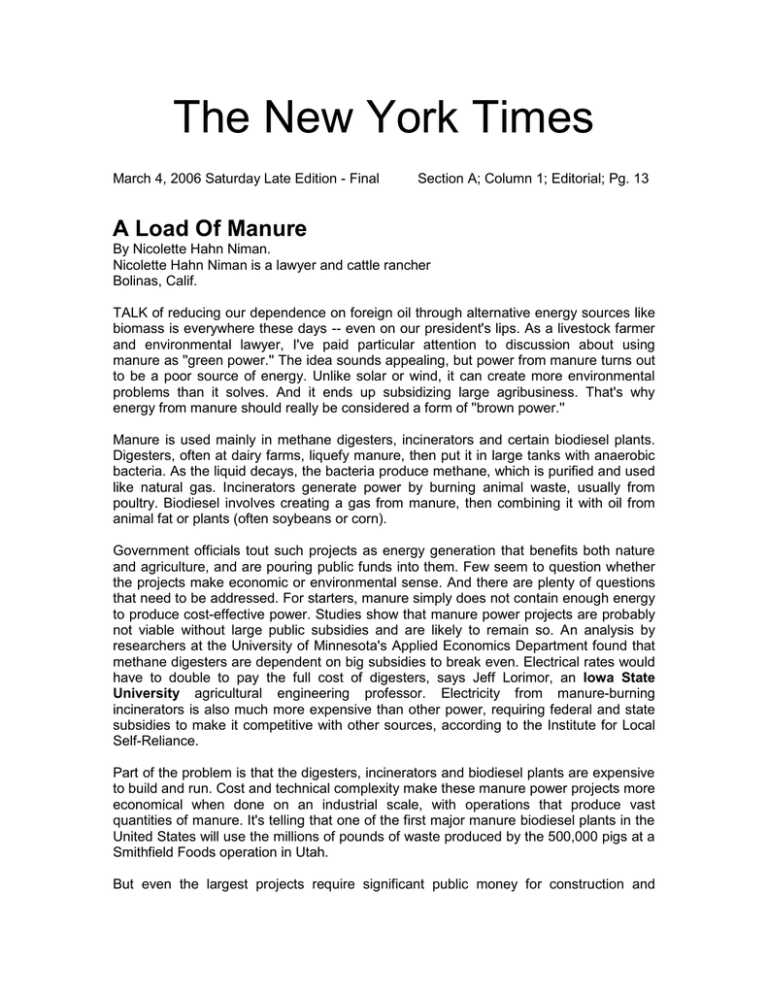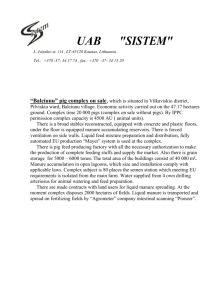The New York Times A Load Of Manure
advertisement

The New York Times March 4, 2006 Saturday Late Edition - Final Section A; Column 1; Editorial; Pg. 13 A Load Of Manure By Nicolette Hahn Niman. Nicolette Hahn Niman is a lawyer and cattle rancher Bolinas, Calif. TALK of reducing our dependence on foreign oil through alternative energy sources like biomass is everywhere these days -- even on our president's lips. As a livestock farmer and environmental lawyer, I've paid particular attention to discussion about using manure as ''green power.'' The idea sounds appealing, but power from manure turns out to be a poor source of energy. Unlike solar or wind, it can create more environmental problems than it solves. And it ends up subsidizing large agribusiness. That's why energy from manure should really be considered a form of ''brown power.'' Manure is used mainly in methane digesters, incinerators and certain biodiesel plants. Digesters, often at dairy farms, liquefy manure, then put it in large tanks with anaerobic bacteria. As the liquid decays, the bacteria produce methane, which is purified and used like natural gas. Incinerators generate power by burning animal waste, usually from poultry. Biodiesel involves creating a gas from manure, then combining it with oil from animal fat or plants (often soybeans or corn). Government officials tout such projects as energy generation that benefits both nature and agriculture, and are pouring public funds into them. Few seem to question whether the projects make economic or environmental sense. And there are plenty of questions that need to be addressed. For starters, manure simply does not contain enough energy to produce cost-effective power. Studies show that manure power projects are probably not viable without large public subsidies and are likely to remain so. An analysis by researchers at the University of Minnesota's Applied Economics Department found that methane digesters are dependent on big subsidies to break even. Electrical rates would have to double to pay the full cost of digesters, says Jeff Lorimor, an Iowa State University agricultural engineering professor. Electricity from manure-burning incinerators is also much more expensive than other power, requiring federal and state subsidies to make it competitive with other sources, according to the Institute for Local Self-Reliance. Part of the problem is that the digesters, incinerators and biodiesel plants are expensive to build and run. Cost and technical complexity make these manure power projects more economical when done on an industrial scale, with operations that produce vast quantities of manure. It's telling that one of the first major manure biodiesel plants in the United States will use the millions of pounds of waste produced by the 500,000 pigs at a Smithfield Foods operation in Utah. But even the largest projects require significant public money for construction and operation. This has also been Europe's experience with manure power projects. And those subsidies tend to help factory farms. Traditional farms, which usually both grow plants and raise animals, recycle manure as organic fertilizer and thus bear the full cost of handling their waste. But large livestock operations can't do that. They put their manure -- and there is a great deal of it -- in huge piles or storage pools that often leak into nearby streams and ground water and exude stenches that make life miserable for neighbors. For them, manure isn't valuable fertilizer but a vexing disposal problem. The stampede for power from manure gives these huge livestock operations a subsidized way to deal with this problem -- and even gives them an incentive to expand. An article about methane digesters in The Des Moines Register quoted a farmer saying that doubling his dairy herd allowed him to justify the expense of a digester. This could well be a typical response, with manure power projects everywhere resulting in still larger herds and flocks. But as the United Nations Food and Agriculture Organization noted last month, concentrated livestock operations threaten the environment and human health in a way that traditional farms do not. It is increasingly clear that traditional, smaller-scale farming is better than factory farms for people, animals and the environment. Even manure power projects' immediate environmental benefits are dubious. Digesters, for example, don't make the manure disappear; instead, a manure slurry (which is sometimes larger than the original volume of manure) is left over and still has to be stored somewhere. Moreover, the slurry contains most of manure's original pollutants, researchers note. In other words, what comes out of a digester may be a bigger problem than what went in. Methane digesters also fail to abate most environmental damage caused by concentrated animal operations, according to the Sierra Club. Farms with digesters still generally use large manure storage ponds, the main source of pollution problems. Incinerators, meanwhile, destroy the valuable components of manure and raise the specter of air emissions. While it's a nuisance on factory farms, manure as it is used on traditional farms greatly benefits soil fertility and tilth, increasing water-holding capacity, reducing wind erosion, improving aeration and promoting beneficial organisms. But many of these benefits are lost in burning. ''Incineration destroys the nitrogen and organic material content of manure,'' reports the Institute for Local Self-Reliance. The institute has calculated that ''an electricity plant that burns 500,000 tons of manure in effect destroys $3 million in nitrogen.'' The fossil fuels involved in hauling manure must also be considered. Incinerators, especially, are centralized and bring waste from farms for miles around, and then the resulting ash must be transported to a disposal site. Despite President Bush's statement that biodiesel ''is one of our nation's most promising alternative fuel sources,'' making biodiesel from manure is also unlikely to be an environmental gain. Burning biodiesel may increase a greenhouse gas, nitrogen oxide, according to the Energy Department. And the full environmental costs of biodiesel fuel include soil erosion and water pollution caused by growing the soybeans and corn used. These crops are now the leading cause of both nitrogen water pollution in the United States and soil erosion. Using manure as power sounds like a good idea, but it's not. The energy that can be generated from manure is not worth the expense. And by lowering industrial animal operations' cost of production, subsidizing manure power pushes family farms further toward the brink of extinction. Our money would be better spent investing in truly sustainable, sensible ways of producing energy and food.






